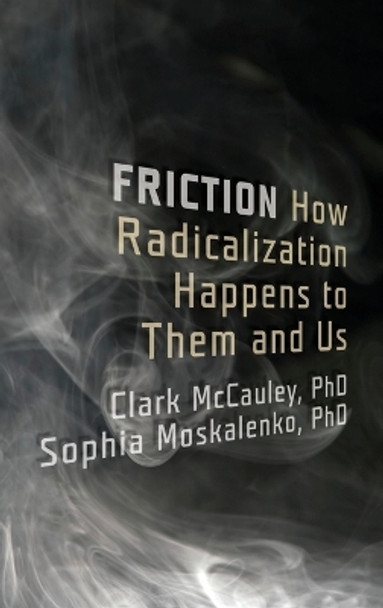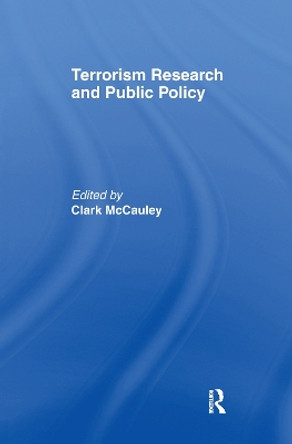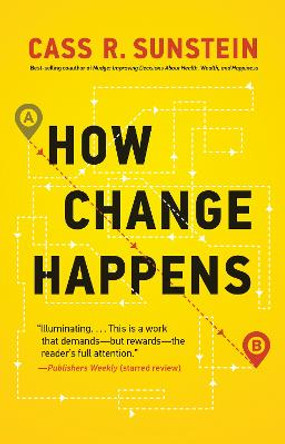Description
About the Author
Clark McCauley is Rachel C. Hale Professor of Sciences and Mathematics and Co-Director of the Solomon Asch Center for the Study of Ethnopolitical Conflict at Bryn Mawr College. He received his Ph.D. in social psychology from the University of Pennsylvania in 1970. With Dan Chirot he co-authored Why Not Kill Them All? The Logic and Prevention of Mass Political Murder, published by Princeton University Press in 2006. He is founding editor of the journal Dynamics of Asymmetric Conflict: Pathways toward Terrorism and Genocide. Sophia Moskalenko is a Postdoctoral Research Fellow at the National Consortium for the Study of Terrorism and Responses to Terrorism (NC-START) and a consultant with the Oak Ridge National Laboratory in Oak Ridge, Tennessee. She received her Ph.D. in social psychology from the University of Pennsylvania in 2004. Her research and publications have focused on group identification, political activism, radicalization, and terrorism.
Reviews
"McCauley and Moskalenko markedly advance and order our understanding of how individuals are radicalized and why the process often yields terrorists. The authors impart needed discipline and common sense to a field where abstract theory unconnected to reality often dominates. Most important, the authors describe and analyze the very personal, dramatic, disorienting, and frequently searing experiences that put men and women on radicalization's path." --Michael Scheuer, former senior officer, Central Intelligence Agency; Adjunct Professor, Security Studies Program, Georgetown University; and author of Imperial Hubris and Osama bin Laden "Anyone concerned with predicting or intervening against intergroup violence should read this book. The authors engagingly present a wide range of case studies to show how individuals, groups, and mass publics are mobilized for political conflict." --Todd Leventhal, Director of Interagency Strategic Communication Network, U.S. Department of State "In this brilliant book, McCauley and Moskalenko exploit our interest in true crime stories to help us overcome our inability to think objectively about the Islamic terrorism we are now battling. They tell us stories about the first modern terrorist group, fighting the Czar in the late 19th century, and then show us the same patterns at work in American homegrown terrorists and Islamic terrorists. This is social psychology at its best DL dramatic stories exemplifying accessible theories, backed up by clever experiments and set into multiple historical contexts. You'll understand terrorists for the first time, and you'll see how we can best thwart their goals by refusing to play their game." --Jonathan Haidt, Professor of Psychology, University of Virginia, and author of The Happiness Hypothesis: Finding Modern Truth in Ancient Wisdom "McCauley and Moskalenko present a vivid, theoretically grounded, and historically wide-ranging account of the social psychological processes that can drive ordinary people to radicalization and violence. The analysis skillfully illuminates a complex phenomenon without trivializing or over-simplifying, and its emphasis on the reciprocal dynamics of conflict adds critical balance. In comparing the Russian revolutionary movement of the nineteenth century to contemporary extremist groups of assorted persuasions, the authors have produced an impressively thorough and compelling explanation of the intricate mechanisms behind the resort to violence in the service of a cause." --Martha Crenshaw, Senior Fellow, Center for International Security and Cooperation, Stanford University, and author of Explaining Terrorism: Causes, Processes and Consequences "What do militants of the old Russian terrorist group, People's Will, and current-day Al Qaeda have in common? Going beyond stereotypes of terrorists' pathological personalities, this book presents compelling evidence of a complex set of causal mechanisms working at the individual and group levels. In many and diverse contexts, this book shows the importance of identification and politicization processes in transforming grievances into action in underground violent organizations." --Donatella Della Porta, Professor of Sociology, European University Institute, and author of Social Movements, Political Violence, and the State: A Comparative Analysis of Italy and Germany "People commonly react to horrendous acts of violence such as the 9/11 attacks by searching for explanations that focus on the culprits. In strong contrast, McCauley and Moskalenko argue that terrorism is fueled by the friction between radical extremists and the individuals and ideas they oppose. This thoughtful, yet readable, book shows that horrendous or not, terrorists cannot escape basic principles of social psychology- but then, neither can the rest of us." --Gary LaFree, Director, National Consortium for the Study of Terrorism and Responses to Terrorism (START), and author of Losing Legitimacy: Street Crime and the Decline of Social Institutions in America "In this excellent book, the authors describe the personal experiences and psychology of individuals, as well as the dynamics of groups, which lead to radicalization. Mechanisms of radicalization- including personal and political grievances, ideals, inducement by friends, the attractions of risk-taking and status, and the interdependence of people in groups-are highlighted through stories of terrorists in earlier times and today. This is a compelling, highly readable book that offers impressive understanding of terrorist individuals and groups." --Ervin Staub, Founding Director, Psychology of Peace and Violence Program, University of Massachusetts at Amherst, and author of Overcoming Evil: Genocide, Violent Conflict, and Terrorism "So much has been written about radicalization that is generic or apocryphal that the field needs desperately to find a contribution that is systematic, research-based, clear, and persuasive. And that is the task that McCauley and Moskalenko have taken on, and triumphantly achieved. The book works analytically; it works because it tells the tales of the violent and radicalized comprehensively, and it works because it does not just focus on 'them', but on 'us, and on the inter-relationship. In short, it is the most important book written on this complex and politicized subject to date." --Stuart Croft, Professor of International Security, Warwick University, UK, and author of Culture, Crisis and America's War on Terror "This book introduces twelve mechanisms that underlie political radicalization and lead to violence and terrorism. In their highly systematic yet readable account, the authors identify mechanisms that can be found at work in every terrorist group, whatever its ideology. The authors provide new and effective tools for understanding political events, and for recognizing and controlling the extent to which radicalization affects all of us. Cases of modern and 19th century terrorists are interwoven to offer vividness and historical depth." -- Ifat Maoz, Director, Smart Communications Institute, Hebrew University of Israel "Weaving historical narrative and psychological theory effectively and, at times, dramatically, the authors provide a holistic approach to one of the most vexing challenges of our time. Written in a refreshingly accessible and readable style, the book will appeal to scholars, practitioners, and general readers alike." --Paul J. Smith, Associate Professor, National Security Decision Making Department, U.S. Naval War College, and author of The Terrorism Ahead: Confronting Transnational Violence in the 21st Century "This remarkably ingenious and enlightening book looks at how radical terrorists are formed. What is so novel is that it compares at great length the Russian revolutionaries, who tried to overthrow the Czarist regime in the late nineteenth and early twentieth century, to the Islamist terrorists who now occupy our attention. The authors show how strongly terrorists believe in what they are doing, how committed they are, and how difficult it is to defeat them even when many of them are killed. This book will help us see more clearly what we are up against, and what we might need to do to limit the damage." --Daniel Chirot, Tamaki Professor of International Studies, Henry M. Jackson School of International Studies, University of Washington, and author of Why Not Kill Them All? The Logic and Prevention of Mass Political Murder "Both long-term students of political violence and a more general readership will find this book fascinating. It will not only be used in the classroom, but (at least in my personal case) be kept on the shelf as a reference book on key social psychological mechanisms of political radicalization. In my opinion, no other work so smoothly integrates a sophisticated treatment of social psychology into the important, and poorly understood, subject of political violence and terrorism." --Roger Petersen, Arthur and Ruth Sloan Chair of Political Science, Massachusetts Institute of Technology, and author of Understanding Ethnic Violence: Fear, Hatred, Resentment in Twentieth Century Eastern Europe "McCauley (Why Not Kill Them All?), co-director of the Solomon Asch Center for the Study or Ethnopolitical Conflict, and Moskalenko, a research fellow at the National Consortium for the Study of Terrorism and Responses to Terrorism, seek a more complex discussion of terrorism, and methodically examine radicalizationEL. A better understanding of the mechanisms under which terrorism thrives can lead to more efficacious counter-terrorism policies. A valuable contribution to the ongoing dialogue." --Publishers Weekly "Written for the lay reader, with recommended reading lists after each chapter, Friction takes a well-integrated and thoughtful approach to the many drivers of unrest and upheaval. It offers valuable insights to students of history, politics, psychology, and war." -- Elissa Malcohn, Psych Central "This book may be of value for students in various introductory, and even some advanced, university courses. Instructors in criminal justice, sociology, political science, and psychology may want to consider this volume for their classes' reading lists." -- Frederick J. Frese, PhD, PsycCRITIQUES "Friction takes a refreshingly newer look at radicalization, and it should be on the list of every reader who is interested in studying and understanding radicalization. Everyone who is fighting against radicalized individuals should read this book so they have a baseline understanding of what they are up against and how individuals who are radicalized can take a perceived wrongdoing from an event in their childhood or early adulthood and use that event as a foundation for radicalization later in life. On a positive note, if one wants to radicalize others for the good of humanity, reading this book will help him or her understand what is involved in motivating others to join a cause and find passion for that cause." -- Dr. Robin L. Thompson, NASA Counterintelligence Office, Journal of Strategic Security "The beauty of Friction is in the organization and writing. McCauley and Moskalenko discuss twelve radicalization mechanisms distinguished at three levels: individual, group, and mass radicalization. To illustrate these mechanisms, the authors liberally sprinkle a wide range of cases throughout the book that take the reader back and forth from the nineteenth century to the present and across many political contexts and cultures... Friction is an excellent book to introduce a widerange of students to research on radicalism and can also serve as a springboard to new research that fills gaps they highlight in existing explanations of radical politics." -- Robert Futrell, University of Nevada, Las Vegas, Journal Mobilization
Book Information
ISBN 9780199747436
Author Clark McCauley
Format Hardback
Page Count 248
Imprint Oxford University Press Inc
Publisher Oxford University Press Inc
Weight(grams) 498g
Dimensions(mm) 236mm * 162mm * 19mm




![Anzio: The Friction of War by Lloyd Clark 9780755314218 [USED COPY] Anzio: The Friction of War by Lloyd Clark 9780755314218 [USED COPY]](https://cdn11.bigcommerce.com/s-zkx5lhzlf8/images/stencil/444x444/products/4868548/4867778/9780755314218__03635.1722073412.jpg?c=1)



![Merde Happens by Stephen Clarke 9780552773515 [USED COPY] Merde Happens by Stephen Clarke 9780552773515 [USED COPY]](https://cdn11.bigcommerce.com/s-zkx5lhzlf8/images/stencil/444x444/products/4881421/4880651/9780552773515__87794.1722127348.jpg?c=1)